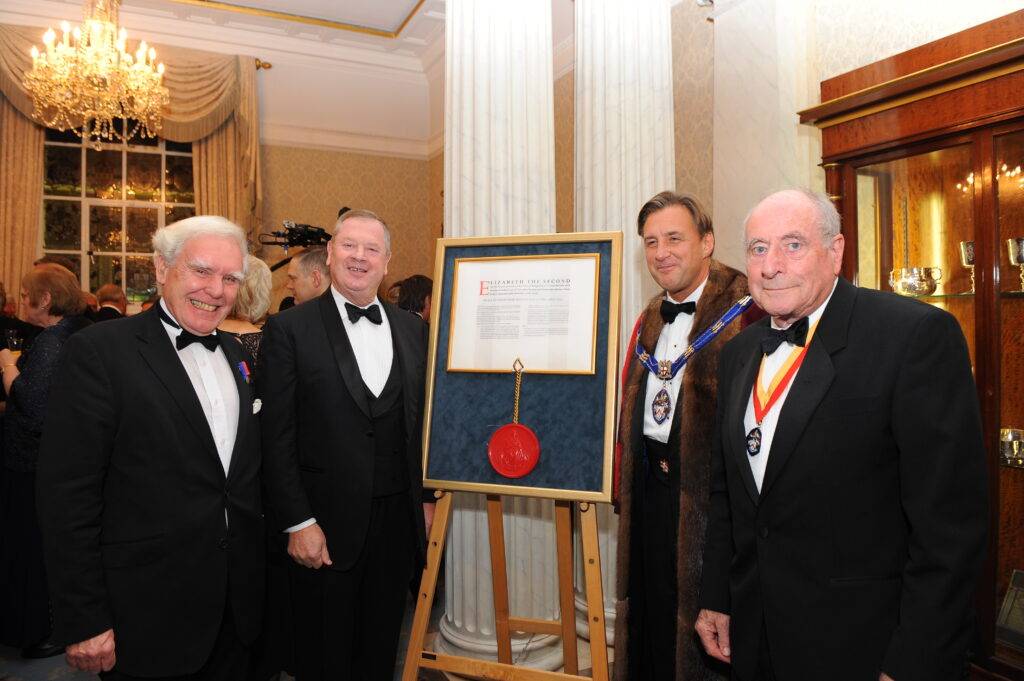News
Remembering Past Master Roger Richardson RD
Roger Richardson, Past Master of The Furniture Makers’ Company, has died aged 93.
Roger was born in 1931 in Golders Green, London. He was educated at Rugby School and Christ’s College, Cambridge. Between the two, he did National Service in the Navy, and after university, he continued in the Royal Naval Volunteer Reserve, becoming a minesweeper captain. He would continue to take a fortnight’s holiday every year to serve in the Royal Navy Reserve into his sixties.
In 1956 Roger joined his father Justin in the family firm, Beaver and Tapley, and remained there until the business was sold in 1998. There never was a Mr Beaver or Mr Tapley – the name was created by the company founder, Roger’s grandfather Newman Richardson, in 1920 to make it sound as if the company was old and established.
Roger became a liveryman of the Worshipful Company of Furniture Makers aged 30 in 1961, he joined the Court – its board – in 1975 and was elected Master in 1988. He served on nearly all the company’s committees – many of them for years longer than the standard three years, became a long-standing Trustee and ended up as a very active Senior Past Master. It is no exaggeration to say that for at least 40 years Roger was at the centre of everything that The Furniture Makers’ Company did.
He was heavily involved in the merger of the Furnishing Trades Benevolent Association and the Worshipful Company of Furniture Makers in 2012.
Roger was rightly nicknamed ‘Red Pen’ as for decades no document seemed to leave the office without being seen by Roger who would always propose sensible improvements to the text – always in red pen. He was also admired for including the invisible word normally in rules and regulations just in case an exception to a rule was needed. Inevitably, it was, and his prescience was lauded.
He became a founder and long-serving member of the Communications Committee where he was instrumental in developing a contemporary and good-looking corporate image for the company. Never happier than when getting things just right, he kerned and kerned again the contents and precise length of the two-line logo: “The Furniture Makers’ Company (is) the furnishing industry’s charity” until he – and others – were totally satisfied. The logo remains unchanged.
When a future Lady Master took over the running of the Communications Committee and presented her first report as chair to the Court, Roger’s immediate quick-fire retort was ‘A chair is an inanimate object with four legs. You are not. I suggest you change your title’.
He was a founder member of the Wine Committee, which suited him well as he loved fine wine, always attended their annual dinner and wrote an informative and entertaining biannual wine list. A fellow wine member described him as having a sense of humour drier than a tart Muscadet but his generosity was as lavish as the Cote d’Or.



Roger always loved good design and disliked poorly designed furniture. He was an early and long-term supporter of the Design Guild Mark, and of the annual Young Furniture Makers Exhibition. He could always be found at other furniture shows looking for something new or indeed discussing a new design or innovation with the stand holder. He had an enquiring mind that continued throughout his life.
Since 1066, only 924 Royal Charters have been granted. The livery decided that they would like one, and Roger volunteered to organise it. All other livery companies or organisations going for a Royal Charter establish a large committee and appointed specialists to advice on every move – at considerable cost. Roger being Roger insisted on doing the entire thing himself with the help at minimal cost of one eminent barrister. Two and a half years later in 2013, Roger was present when Lord Kirkham received the Royal Charter – charter number 888 (000888 on the letterhead).

Almost immediately, he took on the considerable task of trawling through every Court meeting since the Company’s inception in 1952 to write the definitive history of the livery company, ‘The Short History of the Furniture Makers’. Although a mere 102 pages, it is packed with the progress and achievements of the Company and, due to Roger’s 63 years as a liveryman, contains first hand views of many events.
The water was a lifelong passion for Roger, as not only was he proud of his naval career, but he owned a yacht which he and his wife Evelyn sailed for a month every summer round western European waters. The boat was not sold until Roger was nearly in his eighties. His home was waterlocked in Teddington where he kept a small boat at the bottom of his garden which enabled he and Evelyn and friends to go bobbing up and down the Thames River whenever.
They continued taking holidays to far flung corners of the world. One later trip was when he and Evelyn became two of only six commercial passengers aboard a vast oil tanker, joining it in Dubai for the five-week trip to Hong Kong. Unfortunately, it had still only reached Singapore when Roger decided he had had enough of slow-moving internet-light tankers and jumped ship. In his mid-eighties still inquisitive, they travelled by sea from Peru to Easter Island to see the ancient human statues. When asked why he had undertaken such an arduous journey, he replied “Well, I had never seen them”.
Roger also supported and became a trustee of Woodland Heritage, a charity seeking to encourage woodland owners to cultivate their trees commercially for quality timber rather than growing thickets.
He married Evelyn in 1967, and they had a son and a daughter and three grandchildren. Evelyn was an enormous support and encouragement to Roger’s activities. She would not interfere, but Roger always consulted her for her sound advice.
The Furniture Makers and indeed the whole British furniture and furnishing industry, must be enormously grateful that Roger, such an extraordinary supporter of its aims and objectives, should have given so much of his long life to helping advance its causes. His long-term desire was always to help sell more British furniture. He is and will be greatly missed.
Roger’s wishes were for a private family burial and a party to celebrate his life at a later date.
If you would like to make a donation in his memory, his family are raising funds for Princess Alice Hospice that coordinated his care over the last few months.